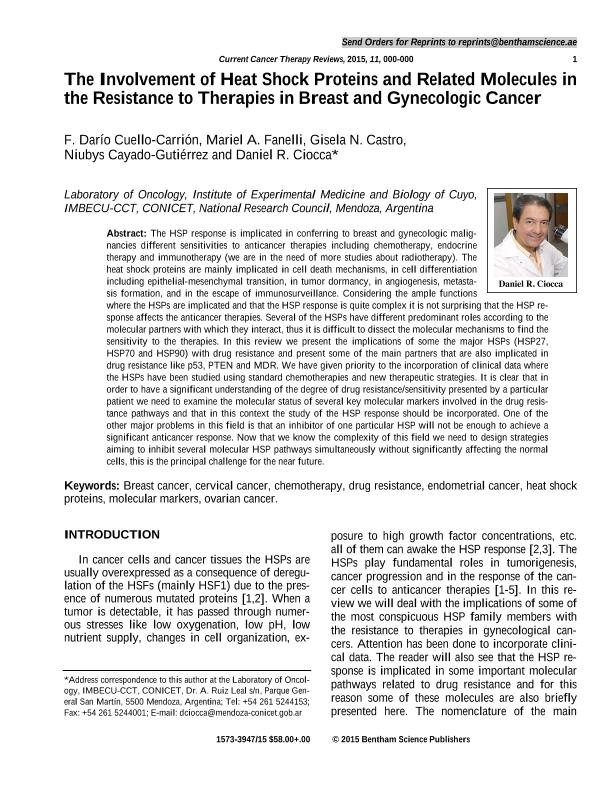Artículo
The involvement of heat shock proteins and related molecules in the resistance to therapies in breast and gynecologic cancer
Cuello Carrión, Fernando Darío ; Fanelli, Mariel Andrea
; Fanelli, Mariel Andrea ; Castro, Gisela Natalia
; Castro, Gisela Natalia ; Cayado Gutiérrez, Niubys de Los Milagros
; Cayado Gutiérrez, Niubys de Los Milagros ; Ciocca, Daniel Ramon
; Ciocca, Daniel Ramon
 ; Fanelli, Mariel Andrea
; Fanelli, Mariel Andrea ; Castro, Gisela Natalia
; Castro, Gisela Natalia ; Cayado Gutiérrez, Niubys de Los Milagros
; Cayado Gutiérrez, Niubys de Los Milagros ; Ciocca, Daniel Ramon
; Ciocca, Daniel Ramon
Fecha de publicación:
10/2015
Editorial:
Bentham Science Publishers
Revista:
Current Cancer Therapy Reviews
ISSN:
1573-3947
Idioma:
Inglés
Tipo de recurso:
Artículo publicado
Clasificación temática:
Resumen
The HSP response is implicated in conferring to breast and gynecologic malignancies different sensitivities to anticancer therapies including chemotherapy, endocrine therapy and immunotherapy (weare in the need of more studies about radiotherapy). The heat shock proteins are mainly implicated in cell death mechanisms, in cell differentiation including epithelial-mesenchymal transition, in tumordormancy, in angiogenesis, metastasis formation, and in the escape of immunosurveillance. Considering the ample functions where the HSPs are implicated and that the HSP response is quite complex it is not surprising that the HSP response affects the anticancer therapies. Several of the HSPs have different predominant roles according to the molecular partners with which they interact, thus it is difficult to dissect the molecular mechanisms to find the sensitivity to the therapies. In this review we present the implications of some the major HSPs (HSP27, HSP70 and HSP90) with drug resistance and present some of the main partners that are also implicated in drug resistance like p53, PTEN and MDR. We have given priority to the incorporation of clinical data where the HSPs have been studied using standard chemotherapies and new therapeutic strategies. It is clear that in order to have a significant understanding of the degree of drug resistance/sensitivity presented by a particular patient we need to examine the molecular status of several key molecular markers involved in the drug resistance pathways and that in this context the study of the HSP response should be incorporated. One of the other major problems in this field is that an inhibitor of one particular HSP will not be enough to achieve a significant anticancer response. Now that we know the complexity of this field we need to design strategies aiming to inhibit several molecular HSP pathways simultaneously without significantly affecting the normal cells, this is the principal challenge for the near future.
Archivos asociados
Licencia
Identificadores
Colecciones
Articulos(IMBECU)
Articulos de INST. DE MEDICINA Y BIO. EXP. DE CUYO
Articulos de INST. DE MEDICINA Y BIO. EXP. DE CUYO
Citación
Cuello Carrión, Fernando Darío; Fanelli, Mariel Andrea; Castro, Gisela Natalia; Cayado Gutiérrez, Niubys de Los Milagros; Ciocca, Daniel Ramon; The involvement of heat shock proteins and related molecules in the resistance to therapies in breast and gynecologic cancer; Bentham Science Publishers; Current Cancer Therapy Reviews; 11; 4; 10-2015; 201-221
Compartir
Altmétricas
Items relacionados
Mostrando titulos relacionados por título, autor y tema.
-
Castro, Gerardo Daniel ; Delgado, Aurora Maria ; Costantini, Martin Hernan; Castro, Jose Alberto (Wiley-liss, Inc, 2001-02)
-
Castro, Gerardo Daniel ; Delgado, Aurora Maria ; Costantini, Martin Hernan; Castro, Jose Alberto (Elsevier Ireland, 2001-03)
-
Nicoud, Melisa Beatriz ; Formoso, Karina ; Medina, Vanina Araceli (Frontiers Media S.A., 2019-05)



